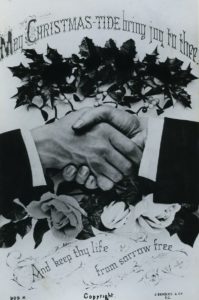Welcome to the fourth day of our Cotton Famine Christmas Countdown! To get us in the festive (sort of) spirit, we’re featuring a seasonal Cotton Famine Poem every day in the run up to our special Christmas event with Jennifer Reid on 20th December. Free tickets for the event are available here: https://www.eventbrite.co.uk/e/the-twelve-cotton-famine-poems-of-christmas-tickets-52954230529
Today’s poem is a clergyman, the Reverend Thomas M. Freeman. It was published in the Manchester Courier on December 13th 1862.
THE STARVING COTTON SPINNERS’ CHRISTMAS LAMENT, A.D. 1862
BY THE REV. THOMAS M. FREEMAN.
Hang on the willow boughs the silent harp,
For bitten by hunger’s cruel fangs so sharp,
Our wasted fingers cannot sound the string,
Nor have our falt’ring voices strength to sing;
Bare is our board this year of Christmas fare,
Our ill-clad limbs shake with the chilly air.
Around the scanty fire out children crowd,
For bread – for bread – their voices cry aloud;
Ah! must we see them pine before our eyes,
Nor have wherewith to pacify their cries?
O pitying One! who in the manger lay,
From heaven – thy throne – look down, and be our stay.
Help us that we heavy cross may bear,
Thy roles of patient suffering meekly wear,
And through black sorrow’s darkly mournful night,
With quiet walking watch for morning light;
Heir of heaven’s riches! for our sakes made poor!
We seek for comfort at thy mercy’s door.
Ye, on whose well-warmed hearths the yule logs burn,
With pity towards your starving brethren turn;
Ye, who your limbs in ample clothing fold,
O, think of us, who shudder with the cold;
While steaming viands on your tables stand,
Let charity’s warm glow your hearts expand.
As a bright star the eastern sages led
To where the infant Saviour placed his head,
So let the light of kindness guide your feet
To our abodes, where suffering has its seat;
For His sake, who came from a heavenly throne,
O, leave us not (we pray) to weep alone.
Our household treasuries, one by one, we’ve sold;
Save the big Bible, and that Prayer Book old
With which our sires and grandsires worshipped,
The comforts of our homes have long since fled;
That Bible tells us who can always bless,
Those prayers shall be our comfort in distress.
O by Thy birth, Thou Son of God most high!
O by the death that thou for man didst die.
This trial sanctify that it may be
A means to bring us nearer unto Thee:
So, life’s voyage ended, we shall find a home
On those bright shores where want can never come.
Mellor, December, 1862.
Commentary
The poem adopts the voice of an out-of-work cotton spinner, who outlines the sufferings of Lancashire’s working class. The bare hearth, pawned goods, and starving children described are familiar themes in Cotton Famine Poetry. Unsurprisingly, given that the poet was a clergyman, the poem draws on religious imagery, reminding the reader of the vulnerability of Christ at the Nativity, but also offering hope in the form of a watchful God and the comforts of an afterlife in Heaven. The fourth stanza also suggests a more immediate source of relief, contrasting the warmth and plenty of Christmas in a wealthy home with the hunger and want of the cotton spinner to encourage charitable giving.
Dr Ruth Mather, University of Exeter.

Victorian Christmas card from Archives New Zealand’s former Post and Telegraph/Telecom Museum Holdings collection.